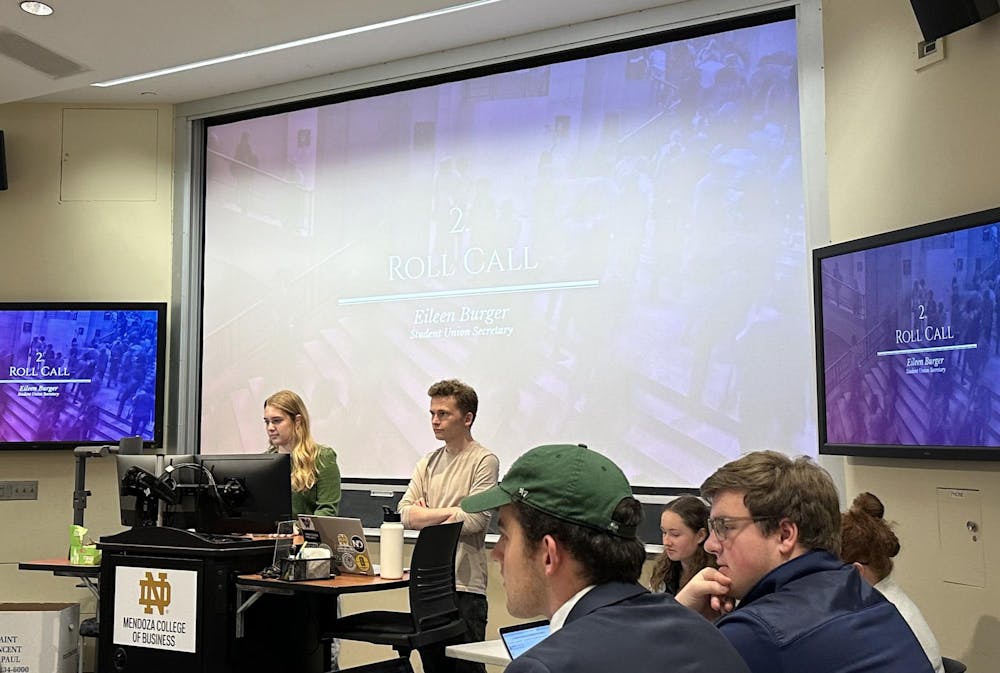The Notre Dame student senate showed up at their Wednesday meeting wearing denim for Denim Day. Denim Day takes place annually on the last Wednesday of April, which is Sexual Assault Awareness Month.
“It’s a day to raise awareness about sexual violence, so always great to see all the denim out there,” student body vice president Maeve Miller said, gesturing to the senators gathered in Mendoza 161.
During the meeting, the senate passed a resolution related to fixing the accumulation of rainwater on St. Joseph Road located between O'Shaughnessy Hall, Malloy Hall and Decio Faculty Hall. They also voted to approve junior Serena Melonio as the vice president of peer advocacy and junior Emma Brainard as The Shirt project president.
As vice president of peer advocacy, Melonio said she wants to increase awareness about resources that are available for students who have an Office of Community Standards (OCS) violation or meeting. “I’m going to help with the marketing of those programs because [the] resources are really valuable so that people don’t walk into OCS completely blind,” she said.
“Another thing that I want to address is what I’m seeing of a gender disparity in OCS consequences … I’m seeing that a lot of female-identifying students are getting harsher punishments and being sent to OCS more often,” she continued.
Following Melonio’s nomination, Brainard spoke about her passion for The Shirt. “We all know The Shirt, but it’s something that means more than a shirt,” she said. “I’ve found that it brings the community together, engages students and makes us feel that we are a part of something bigger than ourselves.”
This is the senate’s third meeting of the 2024-2025 term, and everyone is still learning the ropes of parliamentary procedure or ‘parli pro.’ Parliamentarian Thomas Musgrave gave a brief overview of the procedures at the beginning of the meeting.
“Parliamentary procedure is a code of rules so that people can work together in groups. It provides a way to take legislative ideas and turn them into action that's approved by a big group like this,” he explained.
Musgrave then went on to explain the difference between friendly and unfriendly amendments. A friendly amendment is when the authors of the legislation accept the amendment as proposed.
“Let’s say there’s a spelling error in Hunter’s legislation, and you guys catch it. You can say: ‘I motion to amend this section of the bill.’ If it’s a spelling error, he’s probably going to accept,” Musgrave said. “Unfriendly amendments are ones that Hunter doesn't accept. Let's say he's really passionate about his wrong spelling.”
Following that example of how parliamentary procedure works, Judicial Council President Hunter Brooke suggested and accepted a few friendly amendments related to clarifying wording. The amendments were made to SO 2425-05, which clarifies and simplifies sections of the Constitution.
Brooke was asked why he didn’t split the order, which contains 37 changes, into smaller pieces of legislation. He said, “I didn’t want to make you guys vote on 37 changes independently … and also because my view is that none of this is really changing practice in any meaningful way.”
In addition to passing Brooke’s order to clarify and simplify sections of the Constitution, the senate also voted to pass an order to suspend hall vacancy elections where only one candidate is running unopposed.
In terms of announcements, Miller reminded senators that the ”Thank You Students” celebration with Fr. Jenkins is tomorrow evening. The Student Union Board is also hosting two popular comedians next Wednesday at 7 p.m. in Debart 101. Tickets are free for students.
The Senate's last meeting of the school year is next Wednesday, which coincides with the last day of classes. Five orders of new business must be moved up on the agenda before the senators can start studying for their final exams.










